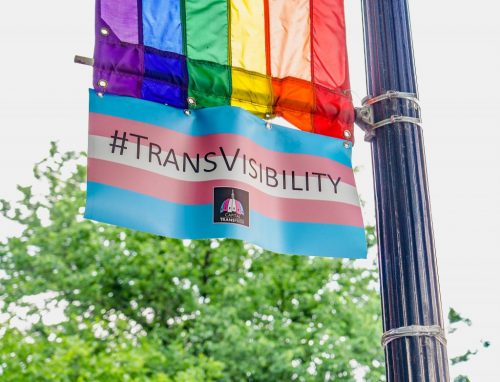By Gloria Gomez/UA Don Bolles Fellow/AZ Mirror
PHOENIX — Her voice shaking with emotion, State Superintendent Kathy Hoffman assured trans kids across Arizona Thursday of her support and acceptance, a strong contrast to the anti-trans rhetoric created by recent legislation.
“We will always stand up for you. We will always have your back, and you are welcome and you are loved for who you are,” she said as LGBTQ rights advocates gathered at the state capitol on Thursday morning, on Trans Visibility Day.
A day before, Gov. Doug Ducey signed bills that would restrict the treatment trans youth could receive and limit what sports teams they could join.
Flanked by signs proclaiming trans rights are human rights, Hoffman sharply criticized lawmakers, saying there are more important issues schools need help with than trans kids wanting to play on teams consistent with their gender identity.
“Lawmakers from the majority have manufactured a crisis to score political points while our classrooms remain underfunded, our class sizes grow as teachers leave the profession and students across the state go without access to school counselors in too many schools … A small number of trans kids wanting to participate in sports is not a real problem,” she said.
Senate Bill 1165 requires public and private schools to strictly categorize sports teams by biological sex, and prohibits transgender students from playing on girl’s teams that compete against other schools, from elementary all the way up to university. The Arizona Interscholastic Association, which oversees the athletic programs of 270 high schools across the state, has received 16 petitions from transgender students since 2017, and has only approved 7 of them.
Hoffman pointed out that similar legislation was vetoed last week by Republican governors in Indiana and Utah, and lamented that Ducey did not follow their example. Placing anti-LGBTQ regulations in schools, she said, was a step backwards to the 1991 “no-promo homo” law that prohibited schools from promoting a “homosexual lifestyle” until 2019.
Bridget Sharpe, director of the Arizona chapter of the Human Rights Campaign, which organized the event, added that there is a clear Arizona precedent for blocking anti-LGBTQ legislation from former Gov. Jan Brewer, who vetoed a bill that would’ve allowed businesses to discriminate against LGBTQ customers in 2014.
Parents at the event spoke out against Senate Bill 1138, which was also approved by the governor and prohibits doctors from providing gender reassignment surgery to transgender minors.
Ai Bin Ho said her daughter knows exactly who she is, and legislation barring her from accessing procedures that could help her affirm her gender identity is government overreach.
“Our elected officials are ultimately telling my daughter that they know her better than she does. Please do not make me tell her that strangers know her mind and her body better than her,” she said.
Making the prohibition into law violates her daughter’s bodily autonomy, she said, and teaches her that strangers have power over her.
Kristen Downing argued that both bills were unfair because they don’t apply evenly across the state’s minor population, but specifically punish one group. SB1138 bans surgeries for transgender minors, but keeps access to the same procedures for minors seeking them for cosmetic reasons. SB1165, she said, lets cisgender girls (born female) play on girls sports teams, only singling out transgender girls.
“Minors in our state have the option to have breast augmentation or reduction surgery … as long as they aren’t trans. Parents in our state have the right to make healthcare decisions for and with their kids — as long as their kids aren’t trans. Girls in this state have the right to play sports with their friends — as long as they aren’t trans,” she said.
In his signing letter, Ducey said the legislation was targeted, while still keeping intact the “dignity, respect and kindness” transgender people should recieve. Downing strongly disputed this statement, saying the legislation was clearly discriminatory.
“Governor Ducey and others in our legislature want to provide the … dignity, respect and kindness for everyone in the state, as long as they aren’t trans,” she said.
Trans teen Skylar Morrison, who has been an outspoken visitor to hearings about anti-trans bills, sent a statement in support of Thursday’s event. The 14-year old has been an activist since she was 7, speaking out against similar bills in Texas, where she moved from after anti-trans legislation passed.
“I want to be safe and be a carefree kid, but here I am, fighting for my rights,” she wrote, “7 years and two states later, when will this discrimination against innocent children stop? When will legislators stop using me to score political points?”
The teen’s name was brought up in a House floor debate by Rep. Walt Blackman, a Republican from Snowflake, shortly before voting to support the SB1138.
The bills go into effect 90 days after the end of the legislative session, but Sharpe warned that wouldn’t be without a fight. While the Human Rights Coalition places more emphasis on helping get pro-equality candidates elected, she said it wouldn’t be opposed to being part of court cases against the laws. The coalition is also still focused on passing the Equality Act to help enshrine non-discrimination for the LGBTQ community at the federal level, she said. Similar acts at the state level have failed.
Gloria Gomez, a senior at the University of Arizona, is the 2022 UA School of Journalism’s Don Bolles Fellow working with editors from the Arizona Mirror. Gomez has interned at the Arizona Daily Star and worked at the Arizona Daily Wildcat. She is a dual major in journalism and political science, with a Spanish minor. She’s a member of the Investigative Reporters and Editors and National Association of Hispanic Journalists. The UA School of Journalism started the fellowship in 1977 to honor Don Bolles, an Arizona Republic reporter killed in a 1976 car bombing.

